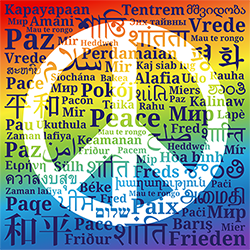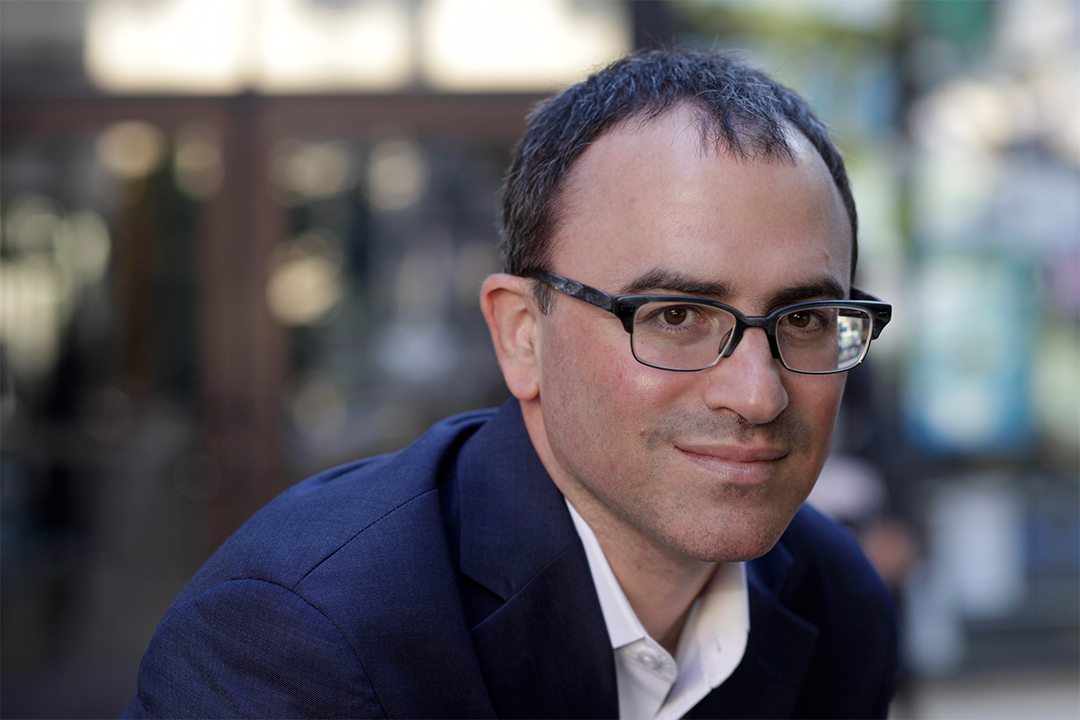Peace. Shalom. As-Salaam-Alaikum. In any language, peace is a state we all want to attain—for ourselves, for our loved ones, for the world. But peace means different things to different people and cultures. With the festive season upon us, Columbian College faculty members from a cross section of disciplines were asked to define what peace means to them. Here’s how they responded.
“Peace means tranquility. Peace means being free from persecution due to one’s nationality, immigration status, race, ethnicity, political affiliation, religious beliefs (or lack thereof) or sexual preference. Peace also comes from the comfort in knowing that you have a roof over your head, food to eat and loving family members and friends. Many people are not free from persecution, nor can they count on the comfort of shelter, food and a supportive social circle. I hope we can keep them in our thoughts this season.”
— Daniel E. Martínez, Assistant Professor of Sociology
“Peace means making meaningful contacts with colleagues of diverse cultures. I am an Israeli. Two of my Islamic art colleagues are from Belgium and Syria. We forget about the terrible news coming from our respective regions, put aside our nationalities and talk person-to-person, one human being to another. We enjoy our philosophical discussions about the horticulture of the Mughals in Kashmir and the signs of modernism in Syrian architecture. Our rapport gives me great solace and helps me be optimistic about the future.”
— Mika Natif, Assistant Professor of Art History
“Peace comes from within, from simple things that affect our spirit, our soul. Peace comes when I wrap my son in my arms. Peace is in shared laughter with a friend, colleague or loved one. Peace is in the grateful smile of a student when we figure out a solution to their problem. Peace is in a connection made through creating art with a client.”
— Heidi Bardot, Assistant Professor of Art Therapy
Director, Art Therapy Program
“In Old Aramaic (the language of ancient Syria), the word for ‘peace’ is 'shalam.' In Old Hebrew (the language of ancient Israel), the word is 'shalom.' And in Old South Arabic (the language of ancient Arabia), the word is 'salam.' These words from the world's ancient Semitic languages are often rendered into English as 'peace,' but the actual meaning is much deeper and broader. After all, these words signified then—and now—not merely the absence of war, but also the presence of good health, serenity, happiness, harmony and safety. During this season, and indeed throughout this year and every year, may we all do our part to bring about 'peace,' in every sense of these grand Semitic words.”
— Christopher A. Rollston, Associate Professor of Northwest Semitic Languages & Literatures
“Peace means living our lives selflessly, treating others with respect, sharing the extra that comes to us with others who have been shortchanged. It means being in the wilderness without fear but with respect for the world around us. It means living as small as possible in material things and as large as possible in good will.”
—J. Houston Miller, Professor of Chemistry
“Peace is an omnipotent knowing of both the prosaic and esoteric; dissecting the inner workings of structure, function and theory; synthesizing each facet, factor and factoid into a greater understanding of, and for, the greater good.”
— Mollie Manier, Assistant Professor of Biology
“I recently sang two roles in the opera Appomattox with the Washington National Opera. The opera spanned 100 years of race in America, from the end of the Civil War to Dr. King and the Voting Rights Act. The libretto dealt directly with the legacy of hatred and injustice that still stains race relations in our country. Every rehearsal and performance was a chance to address these issues for all involved. At the last performance, Congressman John Lewis (who was being depicted on stage) attended. The honor of meeting him is my reminder to work for peace and justice as he did that day on the bridge in Selma, and ever since.”
— Robert Baker, Assistant Professor of Music
Director, Performance Studies
“Many think of ‘peace’ and ‘conflict’ as antagonisms; peace, then, evokes images of calm and tranquility. But struggle—including the political struggles we have seen unfold on college campuses—can be animated by a desire for peace. In this case, peace isn’t necessarily quiet and tranquil. Instead, it is a radical call for freedom from oppressions, and a bold challenge to re-think how we live together in ways that not only honor each other’s dignity but that recognize and redress the violence that has marked—and continues to mark—the everyday. Peace, then, is an ongoing call to imagine living otherwise.”
— Jennifer C. Nash, Assistant Professor, American Studies & Women's, Gender, and Sexuality Studies
Director, Women's, Gender, and Sexuality Studies Program
“In December, we think about peace on earth. But we do not have peace—and will not—until more pressing needs are met. There are human disparities and insufficiencies, not simply in wealth, but in basic survival necessities, in safety, in opportunity. Let us pledge that, in the challenge for attaining peace in our own lives, we will also work to achieve human dignity, justice, freedom and welfare, for all people who share the earth.”
— Paul Poppen, Professor of Applied Social Psychology
“Peace is finding a place that allows me to connect with the world without worry. This usually means being in touch with something inspiring and often visual. That might be an artwork, a historic structure or a path through the woods. Sometimes it’s about being by myself; other times I am peaceful in a crowd. It's the joy of walking my dogs in a field that opens to the sky. Or it's the feeling of being lost in the creation of something new.”
— Martha Morris, Associate Professor of Museum Studies
Assistant Director, Museum Studies Program
“Like many of life’s essentials, peace is hard to savor unless it’s imperiled. With the exception of rare moments of discernment, we tend not to experience peace as a positive state or condition. In our busy and overstretched (but also fortunate) lives, peace is typically what we don’t worry about so we can worry about grant applications, carpools and the like. Events like the Paris massacre drive home the wobbliness of what we wrongly take to be the natural order of things, by reminding us how easily our peace can be disturbed.”
— Daniel Schwartz, Associate Professor of History
Director, Judaic Studies Program
“In Japanese, the word heiwa—'peace'—can be used as an adjective, but sensoo —'war'—is a noun. Linguistically, the function of nouns is to refer to concrete, definite entities. Therefore, this peculiar contrast between the two terms reflects the Japanese speakers' underlying assumption that 'war' should consist of temporally and geographically confined events as opposed to 'peace', which should not be confined. Actually such a perception is not limited to any single language group; it is shared by humanity as a whole. I hope that this basic human assumption will remain forever a universal cognitive property of the human kind, supported by the reality of the world.”
— Shoko Hamano, Professor of Japanese and International Affairs
Chair, Dept. of East Asian Languages & Literature












